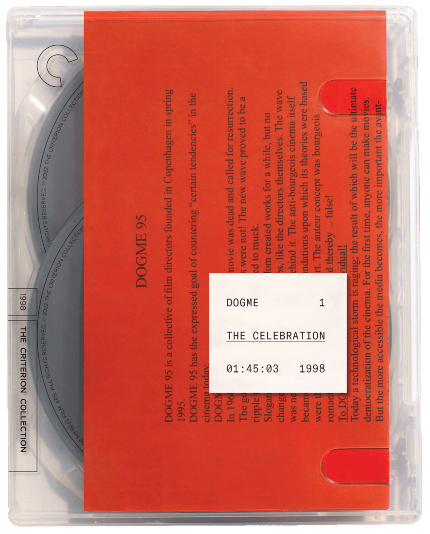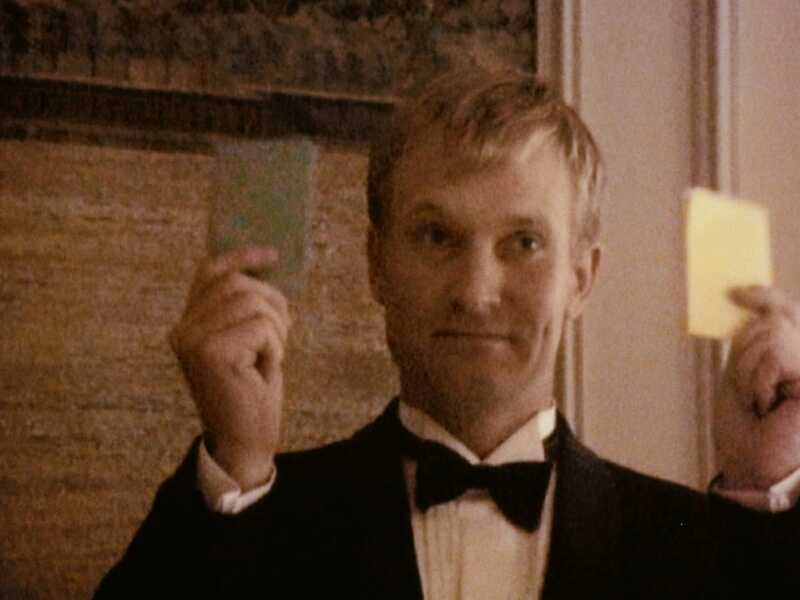Blu-ray Review: THE CELEBRATION, Rampant, Piercing Family Melodrama
Thomas Vinterberg’s hit indie led the Dogme 95 movement in fine form, as celebrated on Blu-ray by the Criterion Collection.

Making most any movie, at one point or another or even throughout, seems impossible. So why on Earth would anyone want to impose an additional set of restrictions, making an already impossible process all the more impossible??
That has been my longtime perspective on Dogme 95, a mid-1990s filmmaking manifesto that called for a “purification” of the art form by stripping away anything the founders deemed non-essential. Common things like artificial sets, lighting set-ups, costumes that the talent didn’t already own, props that weren’t already at the location, any kind of locked-down camera, music scores, songs being played over scenes, directorial screen credit, storyboards, and even celluloid itself became verboten.
Such was the almost comedically restrictive filmmaking “vow of chastity” -- Dogme 95 -- concocted by Danish directors Lars von Trier and Thomas Vinterberg. This would be a long-overdue cinematic “rescue action,” an effort to save the art form from its own fondness for contrivance in technique, execution, and overall purpose.
It took a few years for the first Dogme film to materialize, but von Trier and Vinterberg proved true to form in seriousness about their manifesto. Truer, certainly, than they were to their own established cinematic stylings and habits, all which Dogme 95 was targeted at nullifying. (Essayist Michael Koresky, in the included insert, refers to the aspiration as “aggressive authenticity.”)
Cinema itself -- the communal tradition, as opposed to the technology of capturing moving images onto celluloid -- was celebrating its centennial in 1995. What better time, they thought, to revert to the very beginning? Never mind that 100 years of formal and artistic evolution was being chucked, as though a return to Lumiere exposure tests was the stuff of “purified” moviemaking. Seriously, 100-plus years on, could any good come from Dogme 95??
The answer, perhaps to everyone’s surprise, is “yes.” Vinterberg led the way with the very first “film” (the early efforts were shot on consumer grade video cameras) to open with the official Dogme 95 certificate. “Dogme 1”, Vinterberg’s The Celebration (Festen) is a sublime and gripping work of rampant, piercing family melodrama.
The sharp screenplay, though written by the filmmaker to comply with Dogme’s 10 rules and its staunch edict to forsake “artistry” and “refrain from personal taste,” is a profoundly personal explosion of what isn’t talked about. It was a blast felt around the world, resonating in the form of accolades, awards, and an Oscar-winning film career for Vinterberg. And The Celebration -- and by extension, Vinterberg and his excellent crew and bold cast (including Ulrich Thomsen, Henning Moritzen, Thomas Bo Larsen, Paprika Steen, and Gbatokai Dakinah) earns every bit of the massive acclaim it reaped.
The story takes place in and around an extended family’s formal celebration of their patriarch’s sixtieth birthday. The setting, a lavish residence with vibes of a hotel and a country club, takes on a Buñuel-ian quality when all the guests find that they (for reasons entirely practical, not metaphysical) are unable to leave. But that is not the story. The story is their reason for suddenly wanting to collectively depart.
A speech is given by one of the grown offspring of the man of the hour. The assumed innocuous “happy birthday, dad” speech instead proves to be a calculated moment of revelation, wherein the unspeakable is matter-of-factly spoken. The bomb dropped (which will not be revealed here), though, is only the first phase of condemnation in Vinterberg’s searing depiction of trauma uncovered and ignored.
Once the stunned silence passes -- not once, but several times -- the assembly of family and friends make the active decision to try to carry on with the party. People, when given the out, will almost always choose to look away rather than deal. That’s a major part of what The Celebration is all about. Preceding that, the many forms that abuse can take -- domestic, sexual, racial, psychological, physical, and so forth -- is another.
Criterion has indeed given the many admirers of The Celebration cause to, well, celebrate. This two-disc set is packed to overflowing with special features supplements both new and old. Vinterberg himself took an active role in this release, supervising the new 2K restoration of the videotape-shot motion picture, as well as appearing (quite personably and spirited) in a new video interview.
As viewed on Blu-ray in a resolution more than twice that of the original Sony Handycam footage, The Celebration (in Danish with English subtitles) takes on an almost surreal blotchy and nightmarish visual quality. Much credit for wringing such aesthetic effectiveness from the many imposed Dogme limitations goes to cinematographer Anthony Dod Mantle, who is profiled in a short 2003 documentary called ADM:DOP, which is found on disc two.
The most immediately noticeable aspect of Criterion’s The Celebration is its clever packaging by Century.Studio. With a clear insert bearing only the most basic of black line art (depicting the company’s “C” logo and the spine number 1108), Criterion has truly maximized minimalism. In my house, it was immediately mistaken to be a disc checked out from the public library. That, I suppose, is to its credit.
Visible through the cover is the essay booklet, sporting as its wraparound a two-sided recreation of the red “vow of chastity” flier that Lars von Trier originally threw out to the unsuspecting and bemused attendees of 1995’s Le cinéma vers son deuxième siècle conference. If there’s a gripe to register, it’s that the typeface of the interior couldn’t be smaller.
The wealth of bonus features -- not a dud in the lot -- more than makes up for any shortcomings. Some date back to a previous release from the early 2000s, including a subtitled commentary by Vinterberg in his native Danish. Interestingly, he doesn’t say much about Dogme on the track for a long while.
That phenomenon (if we want to remember it that way) is documented from the inside in the included 2002 hour-plus documentary, The Purified. Here, we are taken into one of the regular Dogme meetings (four directors on couches forever debating the validity of their own movement) and we are shown the moment von Trier papered Le cinéma vers son deuxième siècle. It is a highly worthwhile viewing in the overall experience of Criterion’s The Celebration.
We also get two early short films by Vinterberg: his student thesis Last Round (1993) and the achingly youth centric The Boy Who Walked Backwards (1995). To quote Aaron West, the host of the podcast Criterion Now: "Hard to believe [Last Round] is a thesis film. So much genuine heart and emotion.”
As true as that is, The Boy Who Walked Backwards is even more heartfelt, portraying an O.C.D.-addled boy’s processing the death of his brother as he tries out Superman: The Movie’s notion of turning back time by reversing action. These films demonstrate a fully formed Vinterberg, a filmmaker who, in retrospect, was in fact anything but artistically derailed by the attempted depersonalization of his own Dogme manifesto. Other new and vintage reflections on The Celebration round out the set.
Ultimately, a grand total of 31 films were certified by the Dogme 95 founders before the group broke up in 2005. This, per several critics in the know, is the best of the bunch. That. of course is subjective, but it’s plenty safe to say that Vinterberg vindicated the whole movement straightaway.
Von Trier, Kristian Levring, Søren Kragh-Jacobsen, Harmony Korine and Jean-Marc Barr, among others, soon followed with noteworthy (if not always stellar) Dogme efforts of their own. Were this one the disaster that some thought it would be, who knows if those filmmakers would’ve had the chance to perform their own cinematic “rescue actions.”
As for The Celebration itself, it may not be a good time, but it is a great movie, one that breaks down how, in both the wealthy world of filmmaking and in the world proper, boundaries can be critical.
The Celebration
Director(s)
- Thomas Vinterberg
Writer(s)
- Thomas Vinterberg
- Mogens Rukov
Cast
- Ulrich Thomsen
- Henning Moritzen
- Thomas Bo Larsen








